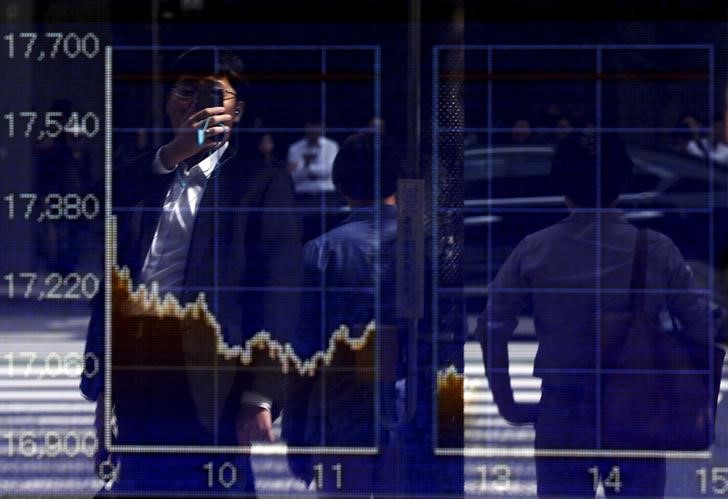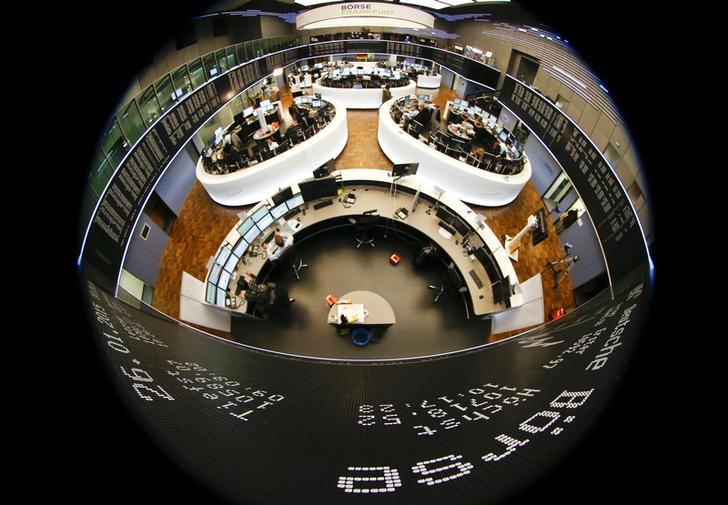By Hideyuki Sano
TOKYO (Reuters) - Asian shares stepped back from two-month highs on Tuesday and commodity currencies retreated as a big fall in oil prices triggered profit-taking after a strong rally, though fading expectations of an imminent U.S. rate hike lent some support.
Trade data from China was mixed - with exports beating forecast and imports below expectations - doing little to dispel concerns over a slowdown in China. Yet rising hopes of more stimulus from China underpinned markets.
MSCI's broadest index of Asia-Pacific shares outside Japan (MIAPJ0000PUS) fell 0.9 percent from their two-month high touched on Monday. Still, it was still up 7.7 percent so far this month. Japan's Nikkei (N225) fell 1.1 percent.
European shares are expected to open flat to weaker, with spreadbetters looking to a 0.2 percent fall in Britain's FTSE (FTSE) and France's CAC 40 (FCHI) and a flat opening in Germany's DAX <.GDAX>.
Oil prices posted their biggest fall in six weeks on Monday as traders took profits after last week's surge to an 11-week high following a report that OPEC continued to boost crude production despite a persistent glut. [O/R]
Brent crude futures (LCOc1) rose 0.6 percent in Asia to $50.17 per barrel, hardly recovering from their 5.3 percent drop on Monday.
China's exports fell 3.7 percent from the same period last year, less than a drop of 6.3 percent forecast by economists in a Reuters poll and a 5.5 percent decline in August. Imports, however, tumbled more than 20 percent.
"The data alone would not be enough to make people optimistic on China. Still, markets appear to be supported by expectations of more stimulus after action by the People's Bank of China yesterday," said Masahiro Ichikawa, senior strategist at Sumitomo Mitsui Asset Management.
China's central bank expanded a scheme on Monday that increases banks' ability to lend, boosting hopes of more measures to support the economy - lifting mainland Chinese shares to seven-week highs.
On Tuesday, Shanghai shares (SSEC) retreated about 0.5 percent but the market mood has improved.
"It's back to normal. There will be ups and downs, but not the kind of panic selling we saw earlier," said David Dai, Shanghai-based investor director at Nanhai Fund Management Co.
The Shanghai composite index fell 45 percent in the 2 1/2 months from mid-June to late August.
On the whole, investors' risk appetite is gradually coming back as they price out a chance of the U.S. Federal Reserve raising interest rates this year.
Fed Governor Lael Brainard reinforced such expectations, saying late on Monday the Fed should hold off on any interest rate hike until it is clear that a global slowdown, difficulties in China, and other international risks will not push the U.S. recovery off course.
In a sign of easing concerns among investors, the CBOE volatility index (VIX), often seen as investors' fear gauge for Wall Street shares, fell to 16.15 percent - its lowest level in two months.
Reduced expectations of a Fed rate hike dented the dollar. Its index against a basket of six major currencies <=USD> dropped to a three-week low of 94.619 on Monday, having dropped 2.2 percent from the high hit on Sept 25. It last stood at 94.833.
The euro firmed to $1.1372
Commodity-linked currencies also slipped, with the Australian dollar falling 0.7 percent to $0.7311

Emerging market currencies also lost momentum after recent gains.The Indonesian rupiah
